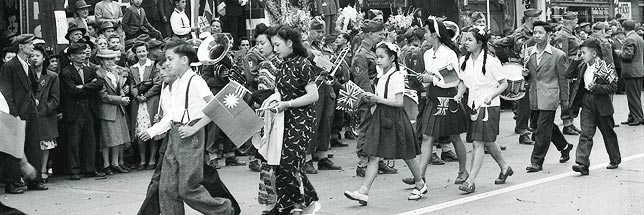There are numerous books and articles that document the difficult history of the early Chinese in Canada. The story of Chinese Canadians in our country’s military history is often overlooked. Yet, it was the involvement in Canada’s war efforts that eventually led the Chinese Canadian community to obtain equal rights and full citizenship in this country.
When the First World War was declared in 1914, a small number of Chinese in Canada volunteered to serve in the Canadian Army. At least one of these men, Frederick Lee of Kamloops, B.C., died on the battlefields of Europe. Lee had been born and raised in Canada yet, in the eyes of the government, he was considered a resident alien.
Despite their service and sacrifices, when Chinese Canadians returned from the First World War, the antagonism and racism toward Chinese in Canada only increased. It culminated in the passing of the Chinese Immigration Act of 1923, commonly known as the Chinese Exclusion Act. This unprecedented law, that went into effect on July 1, 1923 (Canada Day), essentially barred any more Chinese from coming to Canada and. Chinese were the only group singled out for this ban. As well, the Act mandated that all Chinese in Canada be registered (i.e., photographed, questioned and documented) within the year, even those who had been born here.
For those Chinese children born in Canada, the registration resulted in being issued a special card called a C.I.45. The card was emblazoned with the heading “Department of Immigration and Colonization” and contained the footer “This certificate does not establish legal status in Canada.” The document was a reminder that Canadian-born Chinese children did not belong. Many of those who served in the Second World War had been issued these cards as children. And years later, the C.I.45 card galvanized these young men and women to use the war to overturn the discrimination they faced.
At the start of the World War II, a few Chinese volunteered for the Canadian Army. They were accepted and when the war engulfed Hong Kong, more Chinese volunteered. However, the air force and navy at first did not accept anyone of Chinese descent due to their internal policy.
By that time, conscription was a big topic in Chinatowns across Canada. Heated debates took place in between various groups and organizations. “Should Chinese men and women volunteer or wait until the government called their names?”
Those who wanted to volunteer argued that if Chinese wanted to be considered first class citizens, they needed to demonstrate their loyalty to Canada.
Those who were opposed to volunteering replied, “Why should we fight and sacrifice our few Canadian-born children for a country that has treated us so poorly?”
In the end, the Chinese who wished to serve won the argument. Yet, when many of these young men initially tried to to enlist, they were turned away. However, a few years later, as the war raged on and spread to other parts of the globe, Chinese Canadians slowly were accepted into all three branches of the armed forces (army, navy and air force). Some were even seconded to the British Special Operation forces and served secretly behind Japanese lines in Southeast Asia.
Chinese Canadians ended up fighting in every theatre of war. And a few young men even lost their lives in the conflict. Yet, when Chinese Canadian soldiers returned home, they faced the same discriminatory environment they had left behind. The community still could not vote. The Chinese exclusion still was the law.
The veterans of the Second World War became part of a powerful, national campaign that lobbied for equal rights/full citizenship and the repeal of the hated Chinese Exclusion Act.
By 1947, their campaigns were successful. The Chinese Exclusion Act was repealed in May 1947. And a few months earlier, the first Canadian citizenship ceremony for Chinese was held at the Commodore Cabaret ballroom in Vancouver with some 400 in attendance.
Two years later, Chinese were finally allowed to vote in the British Columbia provincial election of 1949, followed by federal election the same year.
Having the vote meant that Chinese Canadians could now enter “professional” careers and become doctors, lawyers and engineers. It also meant being able to enter politics and have more voice over policies that impacted the community.
We often speak of the military service of Chinese Canadians as having helped secure a triple victory: helping the Allies to win the war; helping to repeal the Chinese Exclusion Act; and securing full citizenship for all Chinese Canadians.
